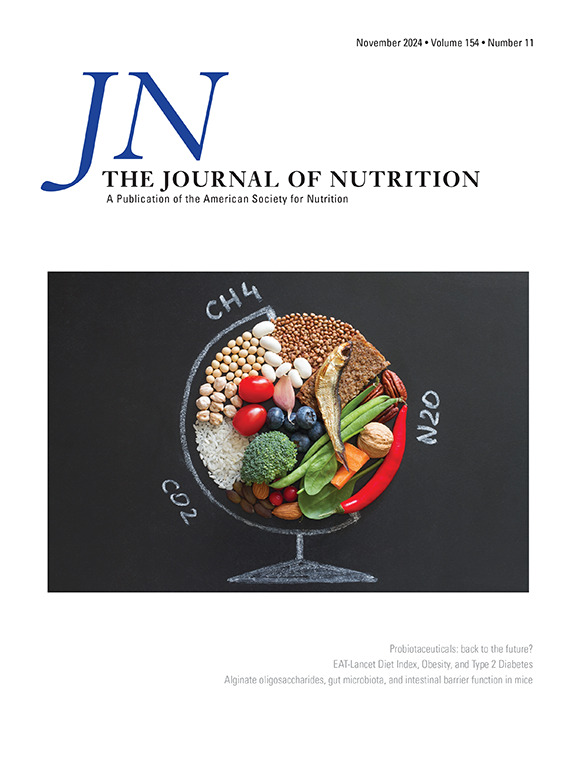胆碱摄入量与肝脏健康生物标志物基因型的关系——横断面分析
IF 3.7
3区 医学
Q2 NUTRITION & DIETETICS
引用次数: 0
摘要
背景:对照饲养研究表明,叶酸介导的一碳和胆碱代谢途径的遗传变异会影响摄入胆碱缺乏后器官功能障碍的风险。进行探索性横断面分析,研究饮食胆碱摄入量与肝功能循环生物标志物之间的关系,这些标志物通常因胆碱不足而受损,并按单碳和胆碱代谢相关酶中常见单核苷酸多态性(snp)的基因型分层。方法:纳入1999-2002年NHANES中未怀孕、未哺乳、有可靠的24小时饮食回忆的美国成年人(≥20岁),并收集用于DNA纯化的血液(即完整的遗传数据)(N= 1438)。平均膳食胆碱摄入量是根据美国农业部的饮食研究食物和营养数据库以及普通食物胆碱含量数据库估算的。使用多元线性回归对每个SNP进行了胆碱摄入量与可用的肝功能生物标志物(经年龄(y)、BMI、空腹血糖、总蛋白和能量摄入调整)之间的关联研究。经bonferroni校正后的结果具有统计学意义:在整个人群中,相对于高摄入量,胆碱摄入量的最低分位数与肝功能障碍标志物升高无关,也与单碳和胆碱代谢途径酶的共同snp分层分析无关。在MTR GG (rs1805087)次要基因型个体中,较高的胆碱摄入量与循环甘油三酯增加相关。结论:在这项探索性NHANES分析中,自我报告的胆碱摄入量与研究人群整体或按基因型分层时循环肝功能生物标志物的恶化无关。我们的研究结果并没有概括控制喂养试验中观察到的关系,这可能是由于习惯性胆碱摄入量较高或使用国家监测样本来评估饮食-x基因相互作用的局限性。有必要在更广泛的营养状况标记的前瞻性队列或对照试验中进一步探索这一研究问题。本文章由计算机程序翻译,如有差异,请以英文原文为准。
Relationship of Choline Intake with Biomarkers of Liver Health by Genotype–A Cross-Sectional Analysis
Background
Controlled feeding studies demonstrate that genetic variation in the folate-mediated one-carbon and choline metabolism pathway influence risk of organ dysfunction from consuming choline-deficient (<50 mg/d) diets. Whether genotype influences the relationship between choline intake and biomarkers of liver function in the general population remains unknown.
Objectives
This study aims to conduct an exploratory cross-sectional analysis to examine the relationship between dietary choline intake with circulating biomarkers of liver function that are commonly impaired by inadequate choline, stratified by genotype across common single-nucleotide polymorphisms (SNPs) in one-carbon and choline metabolism-related enzymes.
Methods
United States adults (≥20 y) in the 1999–2002 National Health and Nutrition Examination Survey (NHANES) who were nonpregnant, nonlactating, had reliable 24-h dietary recall(s), and blood collected for DNA purification (that is, complete genetic data) were included (n = 1438). Mean dietary choline intake was estimated using the USDA’s Food and Nutrient Database for Dietary Studies and the Choline Content of Common Foods Database. Associations between choline intake and available biomarkers of liver function, adjusted for age (y), BMI, fasting plasma glucose, and total protein and energy intake, were investigated for each SNP, using multiple linear regression. Statistical significance was set at a Bonferroni-corrected P < 0.0167 to account for multiplicity across tertiles of choline intake, based on the number of examined genotypes.
Results
The lowest tertile of choline intake was not associated with elevated markers of liver dysfunction relative to higher intakes in the entire population or in analyses stratified by common SNPs in one-carbon and choline metabolism pathway enzymes. Higher choline intake was associated with an increase in circulating triglycerides among individuals with the MTR GG (rs1805087) minor genotype.
Conclusions
In this exploratory NHANES analysis, self-reported choline intakes were not associated with worsening circulating liver function biomarkers in the study population as a whole or when stratified by genotype. Our findings did not recapitulate observed relationships in controlled feeding trials, potentially due to higher habitual choline intakes or limitations of using national surveillance samples to assess diet-x-gene interactions. Further exploration of this research question in prospective cohorts or controlled trials with a broader array of nutritional status markers is warranted.
求助全文
通过发布文献求助,成功后即可免费获取论文全文。
去求助
来源期刊

Journal of Nutrition
医学-营养学
CiteScore
7.60
自引率
4.80%
发文量
260
审稿时长
39 days
期刊介绍:
The Journal of Nutrition (JN/J Nutr) publishes peer-reviewed original research papers covering all aspects of experimental nutrition in humans and other animal species; special articles such as reviews and biographies of prominent nutrition scientists; and issues, opinions, and commentaries on controversial issues in nutrition. Supplements are frequently published to provide extended discussion of topics of special interest.
 求助内容:
求助内容: 应助结果提醒方式:
应助结果提醒方式:


